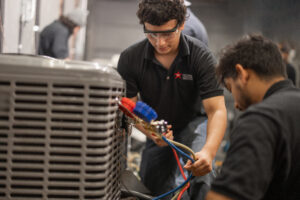Today, a mechanic is not just someone with an affinity for cars who happens to be good with a wrench. For this reason, there are many different types of auto mechanic certifications.
Modern-day Automotive Technicians are highly trained and certified in a number of areas. Depending on the types of engines worked on and specific areas of specialization, there is more than likely some type of necessary certification involved.
Types of Automobile Mechanics
There are several job occupations for people who work on vehicle engines. Heavy-duty, diesel, motorcycle, aircraft, light truck, and passenger car engines each require a specific set of training and skills. Those who specialize in passenger cars and light trucks receive instruction that enables them to work on engines, transmissions, brakes, and electrical systems. They diagnose problems and perform maintenance on every aspect of vehicles and might also focus on body repair.
Here are main areas of focus for automobile technicians:
- Diagnostic Technicians focus on the engine itself. They diagnose problems and perform maintenance to keep engines performing efficiently.
- Transmission Technicians work on gear trains, hydraulic pumps, couplings, and other parts of transmissions.
- Brake Technicians adjust, repair, and replace brake rotors and pads.
- Front-end Technicians diagnose ride and handling as well as align wheels and tires.
- Automotive Air-conditioning Technicians install and repair air-conditioning systems.
It takes about 9 months to complete basic training to become an auto mechanic. After training you can test to earn one or more auto mechanic certification available. Graduates are then ready for employment and can begin working to become certified in one or more areas.
Work As An Auto Mechanic
You might be wondering, do I need to be certified to work as an auto mechanic? To answer your question, most employers of automobile mechanics prefer applicants who have received formal training. Once employed, auto mechanics become eligible to be certified. Automotive air-conditioning technicians, in particular, must have the certification that enables them to handle refrigerants. Auto mechanic certifications show the mechanic\’s competence to do the job and it usually has higher pay attached. Mechanics must have two years of experience (or relevant training and one year experience) and pass an exam to become certified.
ASE Certification
The standard credential for automotive service technicians is certification from the National Institute for Automotive Service Excellence (ASE). ASE certification identifies auto mechanics who can demonstrate the knowledge and skills to diagnose, service, and repair cars, light trucks, and SUVs. Testing to become certified is available year-round at testing centers across the country. The computer-based test is not available online, but registration to take the test is. There is a testing fee involved.
The ASE test includes between 40 and 75 multiple-choice questions that measure knowledge in various content areas. To prepare for the test, the NIASE makes sample tests available online. There is also a demonstration at testing centers where test-takers can view samples of the actual examination to get a feel for what it\’s like. ASE certification credentials are valid for five years. After that time, mechanics must apply for re-certification which requires taking another test.
The 8 Areas of Automotive Certification
There are currently eight different specialty areas to earn auto mechanic certifications for automobiles and light trucks (A series).
- Engine Repair
- Engine Performance
- Automatic Transmission/Transaxle
- Brakes
- Electrical/Electronic Systems
- Heating and Air-conditioning
- Manual Drive Train and Axles
- Suspension and Steering
Technicians who pass all eight tests are recognized as ASE-Certified Master Automobile Technicians. Certification is also available for light vehicle diesel engines, but this certification is not required to become a master automobile technician.
Additional ASE Certification Exams
In addition to the automobile and light truck certification, there are over 40 ASE certification exams offered that cover every aspect of the automotive repair and service industry. Here is a list of those certifications and what they cover.
- Collision Repair and Refinish (B2-B5 Series): skills necessary to properly analyze and repair automotive collision and paint finish damage. B2-Painting and Refinishing; B3-Non-structural analysis and damage repair; B4-Structural analysis and damage repair; B5-Mechanical and electrical components
- Damage Analysis and Estimating (B6): to analyze collision damage and estimate repair costs.
- Automobile Service Consultant (C1): communications, customer and internal relations, vehicle systems, sales skills, and shop operations.
- Truck Equipment (E1-E3 Series): installment, diagnosis, service, and repair all classes of trucks and tractors. E1-Truck equipment installation and repair; E2-Electrical/electronic equipment and repair; E3-Auxillary power systems installation and repair.
- Alternate Fuels (F1): diagnosis, service, and repair of compressed natural gas vehicles.
- Auto Maintenance and Light Repair (G1): common maintenance and light repair tasks.
- Transit Bus (H1-H8 Series): diagnosis, service, and repair of the various systems on transit buses. H1-Compressed natural gas (CNG) systems; H2-Diesel engines; H3-Drive train; H4-Brakes; H5-Suspension and steering; H6-Electrical/electronic systems; H7-Heating ventilation and air-conditioning; H8-Preventive maintenance and inspection.
- Advanced Engine Performance Specialist (L1): diagnosis of sophisticated driveability and emissions-related problems on automobiles, light-duty trucks, and SUVs.
- Electronic Diesel Engine Diagnosis (L2): to diagnose sophisticated diesel engine problems on medium- and heavy-duty trucks.
- Light Duty Hybrid/Electric Vehicle Specialist (L3): diagnosis of hybrid/electric automobiles, light-trucks, and SUVs.
- Parts Specialist (P Series): automobile and medium-heavy truck parts. P1-Medium-heavy truck parts; P2-Automobile parts; P4-General Motors parts.
- School Bus (S1-S7 Series): diagnosis, service, and repair of the subsystems of type A, B, C, and D school buses. S1-Body systems and special equipment; S2-Diesel engines; S3-Drive train; S4-Brakes; S5-Suspension and steering; S6-Electrical/electronic systems; S7-Air-conditioning systems and controls.
- Medium-Heavy Truck (T1-T8 Series): to diagnose, service, and repair the different systems of Class 4 through Class 8 trucks and tractors. T1-Gasoline engines; T2-Diesel engines; T3-Drive train; T4-Brakes; T5-Suspension and steering; T6-Electrical/electronic systems; T7-Heating, ventilation, and air-conditioning; T8-Preventive maintenance inspection.
- Undercar Specialist Exhaust Systems (X1): diagnosis and repair of automobile brakes, suspension and steering, and exhaust systems.
A Career With Auto Mechanic Certifications
If you have a passion for change and you are interested in a new career as an ASE-certified auto mechanic, contact Southern Careers Institute today. We have campuses in Austin, Brownsville, Corpus Christi, Harlingen, Pharr, San Antonio, and Waco, Texas. You can also study online.
Sources
- https://www.mechanictraining.org/types-of-mechanics/auto-mechanic/
- https://www.bls.gov/ooh/installation-maintenance-and-repair/automotive-service-technicians-and-mechanics.htm#tab-2
- https://www.ase.com/Home.aspx
Blog Disclaimer: Information stated in this blog is for general information purposes only. SCITexas.edu not assume or guarantee income earning potential or salary expectations based on the programs offered at Southern Careers Institute.











